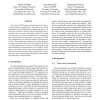Free Online Productivity Tools
i2Speak
i2Symbol
i2OCR
iTex2Img
iWeb2Print
iWeb2Shot
i2Type
iPdf2Split
iPdf2Merge
i2Bopomofo
i2Arabic
i2Style
i2Image
i2PDF
iLatex2Rtf
Sci2ools
109
click to vote
ICDCSW
2006
IEEE
2006
IEEE
Fuzzy Trust for Peer-to-Peer Systems
Peer-to-peer (P2P) systems are based upon the cooperative interactions of member peers. Typically, peers are both autonomous and self-interested, meaning that there is no hierarchy of control or power, and that individuals seek to maximise their own goal achievement, rather than acting in a benevolent or socially-oriented manner. Consequently, interaction outcomes are uncertain, since peers can break their commitments or provide sub-standard contributions or services. Thus, when a peer cooperates it is entering into an uncertain interaction, that has an associated risk of failure or reduced performance. For peers to be effective they need some mechanism for managing this risk of failure. In this paper we show how peers can use trust to manage this risk. Our model of trust uses fuzzy logic to allow peers to represent and reason with uncertain and imprecise information regarding others’ trustworthiness.
Distributed And Parallel Computing | ICDCSW 2006 | Member Peers | Uncertain Interaction | Uses Fuzzy Logic |
Related Content
| Added | 11 Jun 2010 |
| Updated | 11 Jun 2010 |
| Type | Conference |
| Year | 2006 |
| Where | ICDCSW |
| Authors | Nathan Griffiths, Kuo-Ming Chao, Muhammad Younas |
Comments (0)

